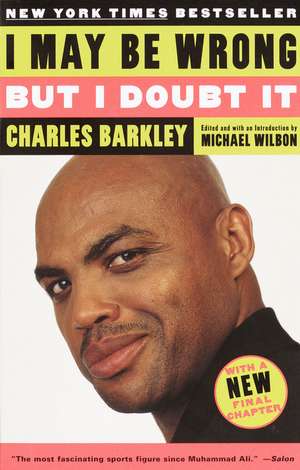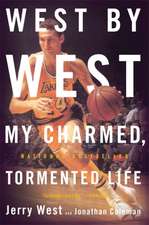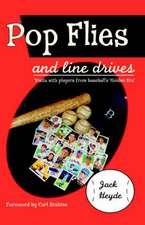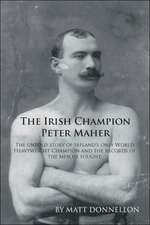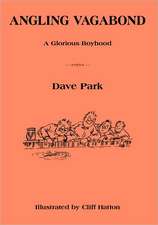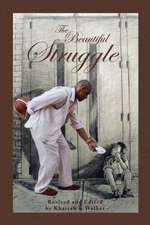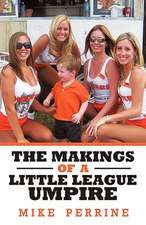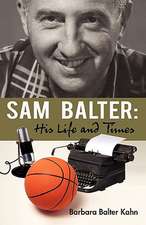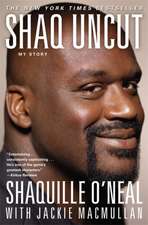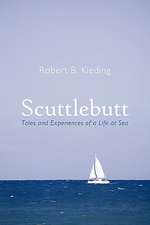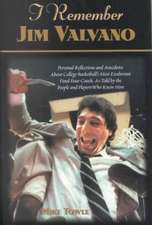I May Be Wrong But I Doubt It
Autor Charles Barkley Michael Wilbonen Limba Engleză Paperback – 30 sep 2003
If there’s one thing Charles Barkley knows, it’s the crying need for honest, open discussion in this country—the more uncomfortable the subject, the more necessary the dialogue. And if the discussion leader can be as wise, irreverent, (occasionally) profane and (consistently) funny as Charles Barkley, so much the better. Many people are going to be shocked and scandalized by I May Be Wrong but I Doubt It, but many more will stand up and cheer. Like Molly Ivins or Bill O’Reilly, Charles Barkley is utterly his own thinker, and everything he says comes from deep reflection. One way or another, if more blood hasn’t reached your brain by the time you’ve finished this book, maybe you’ve been embalmed.
From the Hardcover edition.
Preț: 105.41 lei
Nou
Puncte Express: 158
Preț estimativ în valută:
20.17€ • 21.12$ • 16.69£
20.17€ • 21.12$ • 16.69£
Carte disponibilă
Livrare economică 15-29 martie
Preluare comenzi: 021 569.72.76
Specificații
ISBN-13: 9780812966282
ISBN-10: 0812966287
Pagini: 288
Dimensiuni: 134 x 205 x 15 mm
Greutate: 0.2 kg
Ediția:Rh Trade PB.
Editura: Random House Trade
ISBN-10: 0812966287
Pagini: 288
Dimensiuni: 134 x 205 x 15 mm
Greutate: 0.2 kg
Ediția:Rh Trade PB.
Editura: Random House Trade
Notă biografică
Charles Barkley is a studio analyst for TNT’s Inside the NBA, a regular contributor to CNN’s TalkBack Live and a frequent color commentator. Named one of the fifty greatest NBA players of all time, he was selected to eleven All-Star teams and won the NBA’s MVP award in 1993. He lives in Scottsdale, Arizona.
Michael Wilbon is a Washington Post sports columnist and the cohost, with Tony Kornheiser, of the ESPN show Pardon the Interruption. He lives outside Washington, D.C.
From the Hardcover edition.
Michael Wilbon is a Washington Post sports columnist and the cohost, with Tony Kornheiser, of the ESPN show Pardon the Interruption. He lives outside Washington, D.C.
From the Hardcover edition.
Extras
What's Really on My Mind
I May Be Wrong but I Doubt It isn't a basketball book. It's not really even a sports book, although basketball and sports are the vehicles I'm using to generate a much broader discussion, and are the things I am most intimately familiar with. There's been increased criticism of athletes, sometimes by people in the news media and sometimes by activists, that we run away from dealing with serious social issues, like poverty, racism, politics and education.
Not only am I not running away from these discussions, at this point of my life-approaching forty years old and two years into retirement after a sixteen-year career in the NBA-I usually prefer them. I'm tired of talking about stuff that doesn't matter. I'm tired of "Charles, tell me which coaches you hated during your career," or "Charles, let's talk about which players in the league you don't like," or "Let's talk about groupies."
Most reporters, I can't even convince them to talk about any serious topics, which I'm happy to have the chance to do now. If the topic is groupies, guys will blow my phone up. That's easy. If I want to say something bad about anybody, reporters will hang on every word. That's easy. So don't turn the page thinking you're going to read about that, because that's not what this is. I've done enough of that for the last twenty years. What I've come to realize is that I can have some control over this process. I can talk about whatever the hell I want to talk about.
At this point in my life I'm trying to transition from sports into something broader, with wider social implications. I don't know if you can do it when you're playing. Guys get criticized for not being more socially conscious, for not spending more time talking about social issues, and that criticism may sound legitimate. But if you actually take on some social issues, particularly if you take some unpopular positions, you're going to get hammered.
People say all the time they want you to talk about social issues. But if you do, and if you take a position that doesn't go down easy, you're "militant." My favorite one is, "When is the last time Charles Barkley struggled? What does Barkley know about growing up poor?" Well, I do know. Damn, I was poor. I grew up in the projects in Leeds, Alabama.
If I was still poor, I wouldn't have the platform to speak up about the stuff we ought to be confront-ing. Some years ago, in a Nike commercial most people consider controversial, I suggested that athletes should not be primary role models. I told people to listen to their parents, not to athletes or celebrities, and I got killed for it. Is that bad advice, to say, "Listen to your parents, or your teachers, and not some damn celebrities"?
But that's okay. I'm not overly concerned about people disagreeing with me. I'm concerned with the response in that I want to get people talking, get the discussion started. I'm going to say what's on my mind. Dan Patrick of ESPN, who I like very much, introduced me once as "Charles Barkley, who makes you think, makes you mad, but sometimes doesn't think before he talks." And I said, "Hey, wait a minute. I know exactly what I'm saying. I may say something some people consider controversial or outrageous, but I've thought about it before I said it." I always know what I'm saying, and I'm always prepared for the reaction.
I may ask a dozen people about something, especially when it's a sensitive topic or something that's likely to be explosive. And I like getting input from smart people and people who've experienced things I'll never experience or haven't yet experienced. But ultimately I'm going to make up my mind and say what I really feel. Saying something just for the hell of it isn't worth anything because unless you provoke some conversation, what you're saying is irrelevant. Just because I say something and get a strong reaction or a negative reaction from somebody doesn't mean I didn't anticipate it. I don't like getting caught off guard. Hell, a lot of times I know exactly what's coming and I say it anyway because I feel it needs to be said, or I need to be confrontational on a certain issue. But I've thought about it, trust me.
And I also know people think, "Charles is just saying that to get attention." And, yes, there are times I'll say something crazy or silly because I'm not going to be serious all the damn time. And other times the way to make an important point is by using humor. But when you read my comments in interviews it's not like I was seeking attention. Somebody asked me to sit and talk about something. I didn't go to some publication or network and say, "Hey, I've got some shit to say." They called and asked me to talk about a number of issues. I've started telling people, "Don't ask me if you don't want to hear what's really on my mind, or what I feel is the truth about a subject." Is it okay to express myself only as long as I say what somebody hopes I'll say? Do you think I'm going to say something I don't feel, or just tell people something they want to hear?
In March of 2002 I did a piece for Sports Illustrated with the magazine's longtime basketball writer Jack McCallum, and immediately after it ran I must have had two hundred people come up to me and start to tell me their opinions, what they liked and didn't like. Some people who said they didn't even subscribe to Sports Illustrated said they picked up the issue and read the piece. Most of the media reaction to it had to do with my opinions about Augusta National changing the course, and why I thought they were targeting Tiger Woods. A lot of people come up and say they disagreed with what I said about Augusta National, but I haven't had anybody say to me they disliked the things I discussed in the piece. I would say to almost all of them, "Okay, you disagree with my view on Tiger and Augusta, that's cool. But what did you think of the entire article?" See, it wasn't as important for them to agree with me as to get whoever read it engaged in some sort of discussion or debate about the bigger picture.
I've been criticized for expressing certain views for nearly twenty years. And even though I never minded getting hammered, toward the end of my career I was thinking, "Let me finish my playing career before I start seriously discussing all the social issues of the day. I'll still be in the public spotlight because I'm probably going to be in TV to some extent. Then I'll be better able to handle it." The more serious the subject matter, the more time you need to spend thinking about it and the harder people come at you if they disagree. As I said, I don't have any problem with people who disagree with me because the real reason you take on serious issues is to get some dialogue started on difficult and sensitive topics. But disagreement and ridicule are not the same thing.
Another reason I'm looking at a transition is I don't know that you can give full attention to subjects as serious and as sensitive as race and the economy and education, then just shift into doing all sports. I don't know if the two go together. I've always contended that sports don't help black people. . . . We don't own any of the franchises, don't run any leagues, barely run any teams. You talk to these kids and all they want to talk about is sports, and I guess they don't realize how little other than playing sports black people have to do with the industry. But they all want to play sports. Playing sports is fine, but too often it's all they want to do.
From the Hardcover edition.
I May Be Wrong but I Doubt It isn't a basketball book. It's not really even a sports book, although basketball and sports are the vehicles I'm using to generate a much broader discussion, and are the things I am most intimately familiar with. There's been increased criticism of athletes, sometimes by people in the news media and sometimes by activists, that we run away from dealing with serious social issues, like poverty, racism, politics and education.
Not only am I not running away from these discussions, at this point of my life-approaching forty years old and two years into retirement after a sixteen-year career in the NBA-I usually prefer them. I'm tired of talking about stuff that doesn't matter. I'm tired of "Charles, tell me which coaches you hated during your career," or "Charles, let's talk about which players in the league you don't like," or "Let's talk about groupies."
Most reporters, I can't even convince them to talk about any serious topics, which I'm happy to have the chance to do now. If the topic is groupies, guys will blow my phone up. That's easy. If I want to say something bad about anybody, reporters will hang on every word. That's easy. So don't turn the page thinking you're going to read about that, because that's not what this is. I've done enough of that for the last twenty years. What I've come to realize is that I can have some control over this process. I can talk about whatever the hell I want to talk about.
At this point in my life I'm trying to transition from sports into something broader, with wider social implications. I don't know if you can do it when you're playing. Guys get criticized for not being more socially conscious, for not spending more time talking about social issues, and that criticism may sound legitimate. But if you actually take on some social issues, particularly if you take some unpopular positions, you're going to get hammered.
People say all the time they want you to talk about social issues. But if you do, and if you take a position that doesn't go down easy, you're "militant." My favorite one is, "When is the last time Charles Barkley struggled? What does Barkley know about growing up poor?" Well, I do know. Damn, I was poor. I grew up in the projects in Leeds, Alabama.
If I was still poor, I wouldn't have the platform to speak up about the stuff we ought to be confront-ing. Some years ago, in a Nike commercial most people consider controversial, I suggested that athletes should not be primary role models. I told people to listen to their parents, not to athletes or celebrities, and I got killed for it. Is that bad advice, to say, "Listen to your parents, or your teachers, and not some damn celebrities"?
But that's okay. I'm not overly concerned about people disagreeing with me. I'm concerned with the response in that I want to get people talking, get the discussion started. I'm going to say what's on my mind. Dan Patrick of ESPN, who I like very much, introduced me once as "Charles Barkley, who makes you think, makes you mad, but sometimes doesn't think before he talks." And I said, "Hey, wait a minute. I know exactly what I'm saying. I may say something some people consider controversial or outrageous, but I've thought about it before I said it." I always know what I'm saying, and I'm always prepared for the reaction.
I may ask a dozen people about something, especially when it's a sensitive topic or something that's likely to be explosive. And I like getting input from smart people and people who've experienced things I'll never experience or haven't yet experienced. But ultimately I'm going to make up my mind and say what I really feel. Saying something just for the hell of it isn't worth anything because unless you provoke some conversation, what you're saying is irrelevant. Just because I say something and get a strong reaction or a negative reaction from somebody doesn't mean I didn't anticipate it. I don't like getting caught off guard. Hell, a lot of times I know exactly what's coming and I say it anyway because I feel it needs to be said, or I need to be confrontational on a certain issue. But I've thought about it, trust me.
And I also know people think, "Charles is just saying that to get attention." And, yes, there are times I'll say something crazy or silly because I'm not going to be serious all the damn time. And other times the way to make an important point is by using humor. But when you read my comments in interviews it's not like I was seeking attention. Somebody asked me to sit and talk about something. I didn't go to some publication or network and say, "Hey, I've got some shit to say." They called and asked me to talk about a number of issues. I've started telling people, "Don't ask me if you don't want to hear what's really on my mind, or what I feel is the truth about a subject." Is it okay to express myself only as long as I say what somebody hopes I'll say? Do you think I'm going to say something I don't feel, or just tell people something they want to hear?
In March of 2002 I did a piece for Sports Illustrated with the magazine's longtime basketball writer Jack McCallum, and immediately after it ran I must have had two hundred people come up to me and start to tell me their opinions, what they liked and didn't like. Some people who said they didn't even subscribe to Sports Illustrated said they picked up the issue and read the piece. Most of the media reaction to it had to do with my opinions about Augusta National changing the course, and why I thought they were targeting Tiger Woods. A lot of people come up and say they disagreed with what I said about Augusta National, but I haven't had anybody say to me they disliked the things I discussed in the piece. I would say to almost all of them, "Okay, you disagree with my view on Tiger and Augusta, that's cool. But what did you think of the entire article?" See, it wasn't as important for them to agree with me as to get whoever read it engaged in some sort of discussion or debate about the bigger picture.
I've been criticized for expressing certain views for nearly twenty years. And even though I never minded getting hammered, toward the end of my career I was thinking, "Let me finish my playing career before I start seriously discussing all the social issues of the day. I'll still be in the public spotlight because I'm probably going to be in TV to some extent. Then I'll be better able to handle it." The more serious the subject matter, the more time you need to spend thinking about it and the harder people come at you if they disagree. As I said, I don't have any problem with people who disagree with me because the real reason you take on serious issues is to get some dialogue started on difficult and sensitive topics. But disagreement and ridicule are not the same thing.
Another reason I'm looking at a transition is I don't know that you can give full attention to subjects as serious and as sensitive as race and the economy and education, then just shift into doing all sports. I don't know if the two go together. I've always contended that sports don't help black people. . . . We don't own any of the franchises, don't run any leagues, barely run any teams. You talk to these kids and all they want to talk about is sports, and I guess they don't realize how little other than playing sports black people have to do with the industry. But they all want to play sports. Playing sports is fine, but too often it's all they want to do.
From the Hardcover edition.
Recenzii
"Charles Barkley always makes me laugh, and he always makes me think. He hasn't held anything back in his book -- if anything, this is the most personal I've ever seen him. The only whopper is the title: when has Barkley ever admitted to being wrong?"
-- Tiger Woods
“Whether you think he’s wrong or right, you’ll never find Charles Barkley dull, evasive or afraid. He’s blunt, honest and funny as hell, a man with strong convictions and a determination to express them without fear of offending the sensibilities of more timid souls. He’s got guts, and there’s as much to admire in this book as there is in the man. In I May Be Wrong, But I Doubt It, Barkley refers to one of my campaigns as a rough experience. It might have been, but at least I never had to post up against Sir Charles. Now that would have been really hard.”
-- Senator John McCain
“I find Charles to be great company on the golf course. Of course, he has never been shy about his opinions, and he has not changed for this book! Charles addresses issues that are important to all of us, not just people close to the game of basketball. Frank, funny and provocative, this is a book that will stir people to think.”
-- Dean Smith
From the Hardcover edition.
-- Tiger Woods
“Whether you think he’s wrong or right, you’ll never find Charles Barkley dull, evasive or afraid. He’s blunt, honest and funny as hell, a man with strong convictions and a determination to express them without fear of offending the sensibilities of more timid souls. He’s got guts, and there’s as much to admire in this book as there is in the man. In I May Be Wrong, But I Doubt It, Barkley refers to one of my campaigns as a rough experience. It might have been, but at least I never had to post up against Sir Charles. Now that would have been really hard.”
-- Senator John McCain
“I find Charles to be great company on the golf course. Of course, he has never been shy about his opinions, and he has not changed for this book! Charles addresses issues that are important to all of us, not just people close to the game of basketball. Frank, funny and provocative, this is a book that will stir people to think.”
-- Dean Smith
From the Hardcover edition.
Descriere
Even die-hard followers of the all-time NBA great, the star of TNTUs "Inside the NBA" and CNNUs "TalkBack Live," will be astonished by just how candid and provocative Barkley is in this book--and just how big his ambitions are.
